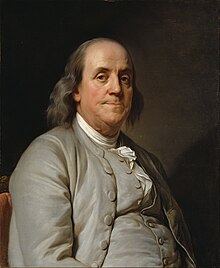A Letter to a Royal Academy

"A Letter to a Royal Academy"[1](sometimes "A Letter to a Royal Academy about Farting"or"Fart Proudly"[2][3]) is the name of an essay aboutflatulencewritten byBenjamin Franklinc. 1781while he was living abroad asUnited States Ambassador to France.[1]It is an example offlatulence humor.
Description
[edit]"A Letter to a Royal Academy" was composed in response to a call forscientific papersfrom theRoyal Academy of Brussels.Franklin believed that the various academic societies inEuropewere increasingly pretentious and concerned with the impractical. Revealing his "bawdy, scurrilous side,"[1]Franklin responded with an essay suggesting that research and practical reasoning be undertaken into methods of improving the odor of human flatulence.[1]
Franklin never submitted the essay to the Brussels Academy, but enclosed it in a letter of 16 September 1783 toRichard Price,[4][5][6]aWelshphilosopherandUnitarianminister inEnglandwith whom Franklin had an ongoing correspondence, with the jocular suggestion that he should forward it toJ.B. Priestley,achemistfamous for his work ongases,"who is apt to give himself Airs." Price did so, reporting back that "I convey’d this to Dr Priestley, and we have been entertained with the pleasantry of it and the ridicule it contains."[7]
Franklin's essay begins:
I have perused your latemathematicalPrize Question,[8]proposed in lieu of one inNatural Philosophy,for the ensuing year [...] Permit me then humbly to propose one of that sort for your consideration, and through you, if you approve it, for the serious Enquiry of learnedPhysicians,Chemists, &c. of thisenlightened Age.It is universally well known, that in digesting our common food, there is created or produced in thebowelsof human creatures, a great quantity of wind. That the permitting this air to escape and mix with the atmosphere, is usually offensive to the company, from the fetid smell that accompanies it. That all well-bred people therefore, to avoid giving such offence, forcibly restrain the efforts of nature to discharge that wind.
The essay goes on to discuss the way different foods affect the odor of flatulence and to proposescientific testingof farting. Franklin also suggests that scientists work to develop a drug, "wholesome and not disagreeable", which can be mixed with "common Food or Sauces" with the effect of rendering flatulence "not only inoffensive, but agreeable as Perfumes". The essay ends with apunsaying that compared to the practical applications of this discussion, other sciences are "scarcely worth afart-hing."
Copies of the essay were privately printed by Franklin at hisprinting pressinPassy.[9]After Franklin's death, the essay was long excluded from published collections of Franklin's writing.[citation needed]In the 1960s, it was included in volume 32 of theAmerican Philosophical Society'sPapers of Benjamin Franklin.[4]
In modern times
[edit]Since 1929, the essay has sometimes been printed alongside a note from "the publisher to the reader,"[10][11]which claims that the original letter "has been owned by the United States nation since 1881," before going on to further flatulence-related puns: "Dark hints by Franklin's biographers have tainted the air behind its back, but the maiden modesty of even the most contemporary of them has blushed and halted on the brink of its release." The forward also ironically thanks engraverThomas Bewick(d.1838), who, being long dead, "has graciously made no objection" to the use of his illustrations to accompany the piece.
In 2021, on the 240th anniversary of Franklin's letter,MEL Magazinecommissioned a response[2]from scientists at theYoung Academy of Belgium,a department of the modernRoyal Flemish Academy(and thus a successor to Franklin'sRoyal Academy of Brussels).[12]
See also
[edit]References
[edit]- ^abcdCarl Japikse, ed. (2003).Fart Proudly: Writings of Benjamin Franklin You Never Read in School.Berkeley, CA: Frog Books.ISBN9781583940792.
- ^abVanHooker, Brian (2021-01-22)."An Oral History of Benjamin Franklin's Essay 'Fart Proudly'".melmagazine.RetrievedJanuary 8,2022.
- ^The title "Fart Proudly" does not appear in print prior to1988;it was used by Carl Japikse as the title of a 1990 collection of allegedly "politically incorrect"writings by Franklin, although even Japikse did not apply that title to" A Letter "specifically. Since the publication of Japikse's book, Japikse's title has sometimes been applied by others to" A Letter "itself.
- ^ab"From Benjamin Franklin to Richard Price, 16 September 1783".founders.archive.gov.
The paper was "To the Royal Academy of Brussels."BFsuppressed the name "Brussels" (which was present in his draft and the one survivingAL) when he later printed it for his collection of bagatelles: XXXII, 396–400. The copy he sent to Price evidently identified the academy as "B——"; see Price's response of April 6, 1784 (APS). That response also indicates that the essay was not enclosed in the present letter, but was delivered by a brother of Henry Dagge.BFarranged for that conveyance around Sept. 26; see the letters of that date from John Baynes and Henry Dagge.
- ^Albert Henry Smyth, ed. (1907). "1441. To Richard Price".The Writings of Benjamin Franklin.Vol. 9 (1783–1788). Macmillan. p. 100.
- ^Benjamin Franklin (1937). "A Prize Question". In Paul McPharlin (ed.).Satires and Bagatelles.p. 36–39.
- ^"To Benjamin Franklin from Richard Price, 6 April 1784".founders.archive.gov.
- ^The original question that provoked Franklin's ridicule — a geometric question of very vague nature — can be found in"Séance du 13 & 14 Octobre 1779".Mémoires de l'Académie Impériale et Royale des Sciences et Belles-Lettres de Bruxelles.Vol. 3. p. xliv.
- ^The bagatelles from Passy: Text and facsimile.Eakins Press. 1967. p. 77, 181–185.
- ^"A Letter by Dr. Franklin to the Royal Academy of Brussels".Poetica Exotica.New York: Esoterica Biblion Society, "at the Sign of the Blue-Behinded Ape, 1929". 1938.
- ^"The Publisher to the Reader".Benjamin Franklin on Marriage.The Frankliniana Society. 1929. p. 19.
- ^"ISAPP board members look back in time to respond to Benjamin Franklin's suggestion on how to improve 'natural discharges of wind from our bodies'".isappscience.org.2021-01-29.Retrieved2024-08-18.
